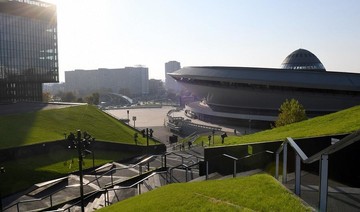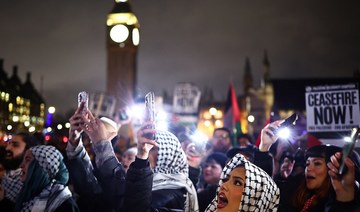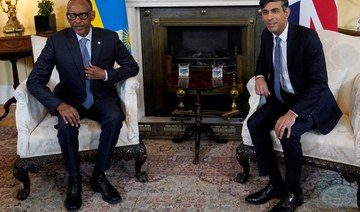KATOWICE, Poland: Nearly 200 countries at the UN climate talks have agreed upon universal, transparent rules on how nations can cut greenhouse gas emissions and curb global warming, putting the principles of the 2015 Paris climate accord into action.
But to the frustration of environmentalists and a group of countries who were urging more ambitious climate goals, negotiators on Saturday delayed decisions on two other climate issues until next year in an effort to get a deal on them.
“Through this package, you have made a thousand little steps forward together,” said Michal Kurtyka, a senior Polish official chairing the talks.
He said while each individual country would likely find some parts of the agreement it didn’t like, efforts had been made to balance the interests of all parties.
“We will all have to give in order to gain,” he said. “We will all have to be courageous to look into the future and make yet another step for the sake of humanity.”
The talks in Poland took place against a backdrop of growing concern among scientists that global warming on Earth is proceeding faster than governments are responding to it. Last month, a study found that global warming will worsen disasters such as the deadly California wildfires and the powerful hurricanes that have hit the United States this year.
And a recent report by the Intergovernmental Panel on Climate Change, or IPCC, concluded that while it’s possible to cap global warming at 1.5 degrees Celsius (2.7 degrees Fahrenheit) by the end of the century compared to pre-industrial times, this would require a dramatic overhaul of the global economy, including a shift away from fossil fuels.
Alarmed by efforts to include this in the final text of the meeting, the oil-exporting nations of the US, Russia, Saudi Arabia and Kuwait blocked an endorsement of the IPCC report mid-way through this month’s talks in the Polish city of Katowice.
The final text at the UN talks omits a previous reference to specific reductions in greenhouse gas emissions by 2030, and merely welcomes the “timely completion” of the IPCC report, not its conclusions.
Last-minute snags forced negotiators in Katowice to go into extra time, after Friday’s scheduled end of the conference had passed without a deal.
One major sticking point was how to create a functioning market in carbon credits. Economists believe that an international trading system could be an effective way to drive down greenhouse gas emissions and raise large amounts of money for measures to curb global warming.
But Brazil wanted to keep the piles of carbon credits it had amassed under an old system that developed countries say wasn’t credible or transparent.
Among those that pushed back hardest was the United States, despite President Donald Trump’s decision to pull out of the Paris climate accord and his promotion of coal as a source of energy.
“Overall, the US role here has been somewhat schizophrenic — pushing coal and dissing science on the one hand, but also working hard in the room for strong transparency rules,” said Elliot Diringer of the Center for Climate and Energy Solutions, a Washington think tank.
When it came to closing potential loopholes that could allow countries to dodge their commitments to cut emissions, “the US pushed harder than nearly anyone else for transparency rules that put all countries under the same system, and it’s largely succeeded.”
“Transparency is vital to US interests,” added Nathaniel Keohane, a climate policy expert at the Environmental Defense Fund. He noted that breakthrough in the 2015 Paris talks happened only after the US and China agreed on a common framework for transparency.
“In Katowice, the US negotiators have played a central role in the talks, helping to broker an outcome that is true to the Paris vision of a common transparency framework for all countries that also provides flexibility for those that need it,” said Keohane, calling the agreement “a vital step forward in realizing the promise of the Paris accord.”
Among the key achievements in Katowice was an agreement on how countries should report their greenhouses gas emissions and the efforts they’re taking to reduce them. Poor countries also secured assurances on getting greater predictability about financial support to help them cut emissions, adapt to inevitable changes such as sea level rises and pay for damages that have already happened.
“The majority of the rulebook for the Paris Agreement has been created, which is something to be thankful for,” said Mohamed Adow, a climate policy expert at Christian Aid. “But the fact countries had to be dragged kicking and screaming to the finish line shows that some nations have not woken up to the urgent call of the IPCC report” on the dire consequences of global warming.
In the end, a decision on the mechanics of an emissions trading system was postponed to next year’s meeting. Countries also agreed to consider the issue of raising ambitions at a UN summit in New York next September.
Canada’s Environment Minister Catherine McKenna suggested there was no alternative to such meetings if countries want to tackle global problems, especially as multilateral diplomacy is under pressure from nationalism.
“The world has changed, the political landscape has changed,” she told The Associated Press. “Still you’re seeing here that we’re able to make progress. We’re able to discuss the issues. We’re able to come to solutions.”
Nations at climate talks back universal emissions rules
Nations at climate talks back universal emissions rules
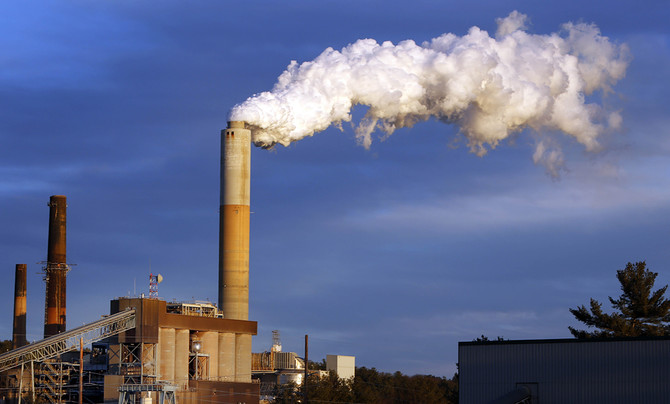
- Negotiators delayed decisions on two key issues until next year in an effort to get a deal on them
- “We will all have to be courageous to look into the future and make yet another step for the sake of humanity”
Bangladeshi students rally in solidarity with global student movement against Israel
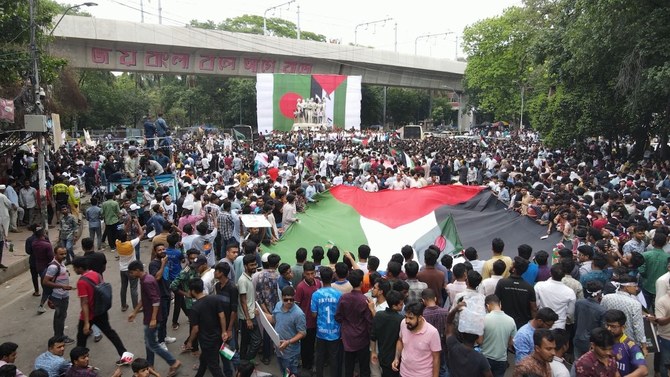
- US student protests have sparked more around the world, including in India, France, Australia
- Dhaka’s thousands-strong rally took place at Bangladesh’s largest, oldest tertiary institution
DHAKA: Thousands of people protesting Israel’s war on Gaza rallied at one of Bangladesh’s top universities on Monday in solidarity with the student-led protests and occupations sweeping the globe.
Pro-Palestinian student leaders and activists from different universities marched and carried flags of Bangladesh and Palestine, chanting slogans in solidarity with Gaza as they made their way to Dhaka University, Bangladesh’s largest and oldest tertiary institution.
Their protest culminated at the symbolic Aparajeyo Bangla sculpture, one of the most well-known landmarks dedicated to the Bangladesh Liberation War of 1971.
“Our stance is very clear: We express solidarity in support of a free Palestine state, in favor of a world free from war. And we support the demands made by US students, like divestment from Israel and other organizations that support the Israeli aggression,” Saddam Hussain, president of the organizing student group Bangladesh Students’ League, told Arab News.
They are also rallying in solidarity with the global student movement, he added.
“We believe all protests hold the same spirit of the youth, be it on the banks of the Atlantic or here on the bank of River Padma,” he said.
“The youths around the world have a common dream, and I urge all of them to move forward to make this dream come true. I hope all the youths of the world will join in this protest to build a world free from war, free and guided with humanitarian spirit.”
The Israeli strikes on Gaza that began in October have killed nearly 35,000 people in the Palestinian territory, mostly women and children. The leader of the World Food Program said over the weekend that parts of the Gaza strip were experiencing a “full-blown famine” that was spreading across the besieged enclave.
Students started to rally or set up tents at various universities around the US last month to protest Israel’s war on Gaza, sparking a global solidarity movement among the youth in India, Australia, France and elsewhere, with many putting pressure on their administrators and governments to cut ties with Tel Aviv.
While US colleges have seen protests since October, the unrest has escalated in recent weeks after police arrested pro-Palestine demonstrators at an encampment in Columbia University, sparking even more campsites at other campuses, as well as more crackdowns and arrests.
Unlike in the US, students in Dhaka were able to protest peacefully with scant police presence.
“The US and some other big players always speak in favor of freedom of speech. But what we have seen in the university campuses in the US is a shame for world leaders,” Solaiman Khan, a 23-year-old Dhaka University student, told Arab News.
“It’s a double standard. We, the youth (of Bangladesh), came out to the streets against this sort of hypocrisy from the superpowers of the world.”
Khan said the violence against Palestinians must be “stopped now and forever.”
“We have seen enough atrocities done by the Israeli forces. How many more lives must the world lose? Is it not enough?” he said.
“I think world leaders should come to their senses and act more rationally in stopping the atrocities in Gaza orchestrated by the occupying Israeli forces. Now is the time to play a decisive role. Otherwise, the next generation will not forgive us.”
Pro-Palestine Oxbridge students set up encampments

- They are demanding transparency about the universities’ financial links to Israel
- ‘We will not move until our demands are met’
LONDON: Students at the universities of Oxford and Cambridge have set up encampments in support of Palestine, The Times reported on Monday.
Around 50 have refused to leave the lawn of King’s College, Cambridge, while students have also declared a “liberated zone” outside Oxford’s Pitt Rivers Museum.
A banner hung outside King’s College read: “Welcome to the people’s university for Palestine.” Chants of “stop the bombing now” have also been heard on the campus.
The protests have been organized by Oxford Action for Palestine and Cambridge for Palestine.
They are demanding transparency about the universities’ financial links to Israel, which they have described as a “settler colonial state,” and are calling for the end of all investments and endowments from Israeli and Israel-linked companies.
“We have set up camp in university grounds, and we will not move until our demands are met,” the groups said in a statement, adding that the universities are legitimate targets for protests because of their “role in the British empire and its disastrous colonial legacies.”
The Times reported that protesters had been given an itinerary for their involvement including “de-escalation training” and “banner-making.”
A spokesperson for Cambridge University said it is for the college to decide whether to call the police, adding: “The university is fully committed to academic freedom and freedom of speech within the law and we acknowledge the right to protest.
“We ask everyone in our community to treat each other with understanding and empathy. Our priority is the safety of all staff and students.
“We will not tolerate antisemitism, Islamophobia and any other form of racial or religious hatred, or other unlawful activity.”
The relatively small UK protests come after nearly 2,000 people were arrested across the US after widespread demonstrations on over 130 American university campuses about Israel’s ongoing war in Gaza.
Muslim group issues UK Labour Party leader with demands over Gaza
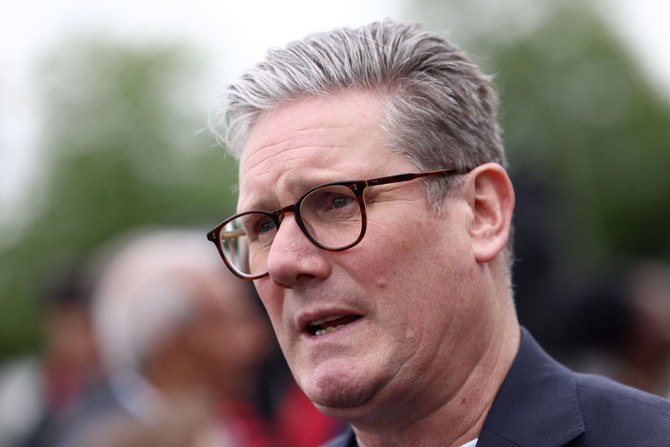
- Muslim Vote group calls for ‘real action’ to regain trust
- Support for Labour in recent local elections fell in areas with high Muslim populations
LONDON: Pro-Palestinian activists have presented a list of 18 demands to the leader of Britain’s opposition Labour Party and said they will not vote for the party at the next general election if he does not fulfill them.
The Muslim Vote, a campaign to get Muslim voters to back pro-Palestine candidates, has called for Sir Keir Starmer to promise to cut military ties with Israel, implement a travel ban on Israeli politicians involved in the war in Gaza and impose sanctions on companies operating in occupied territories.
The group told Starmer he must commit to “real action” and deliver on its requests if he was “serious” about his pledge to rebuild trust with those angered by his stance on the conflict in Gaza, The Telegraph reported.
Supporters would vote for the Green Party or Liberal Democrats if he could not commit to their demands, it said.
Labour’s campaign chief Pat McFadden acknowledged that Starmer’s approach to the conflict had cost the party votes at last week’s local elections. Support for Labour dropped dramatically in areas with a high Muslim populations, including Oldham in Greater Manchester, where the party lost overall control of the council in a shock defeat.
After the result, Starmer said he was determined to regain the trust of those who abandoned Labour as a result of his stance on the Gaza war but did not make any concrete pledges on the matter.
The Muslim Vote challenged Starmer with committing to the 18 demands and implementing them should he become the next prime minister.
They include removing the definition of extremism introduced by Secretary of State for Leveling Up, Housing and Communities Michael Gove and issuing guidance that allows Muslims to pray at school.
Philippines rules out use of water cannon in disputed South China Sea

- Philippines and China have clashed several times in disputed, resource-rich waterway
- Latest skirmish took place late last month, in an incident Manila describes as dangerous
MANILA: President Ferdinand Marcos Jr. said on Monday that Manila will not use offensive equipment in the disputed South China Sea, after China’s coast guard used high-pressure water cannon on Philippine vessels last week.
The Philippines and China have had several confrontations in the resource-rich area, where Beijing has used water cannon against Filipino vessels in incidents Manila has described as harassment and dangerous.
The latest in a string of maritime clashes occurred on April 30 as tensions continued to rise in the vital waterway that Beijing claims almost in its entirety despite a 2016 international arbitration ruling that rejected its assertion.
“What we are doing is defending our sovereign rights and our sovereignty in the West Philippine Sea. And we have no intention of attacking anyone with water cannons or any other such offensive (weapons),” Marcos said Monday.
“We will not follow the Chinese coast guard and the Chinese vessels down that road because it is not the mission of the navy (or) our coast guard to start or to increase tensions … Their mission is precisely the opposite, it’s to lower tensions.”
Philippine vessels have been regularly targeted by Chinese ships in areas of the South China Sea that are internationally recognized as belonging to the Philippines, which Manila calls the West Philippine Sea.
The Philippines’ Ministry of Foreign Affairs last Thursday summoned Zhou Zhiyong, China’s deputy chief of mission, after the incident left a Philippine coast guard vessel and another government boat damaged.
It was the 20th protest Manila has made against Beijing’s conduct in the South China Sea this year alone, while more than 150 diplomatic complaints have been made over the past two years.
Marcos said the Philippines will continue to respond to South China Sea incidents through diplomatic means.
Marcos’s statement comes days after the defense ministers of the Philippines, the US, Japan and Australia met in Hawaii and issued a joint statement on their strong objections to the “dangerous and destabilizing conduct” of China in the South China Sea.
UK considered Rwanda-style asylum deal with Iraq
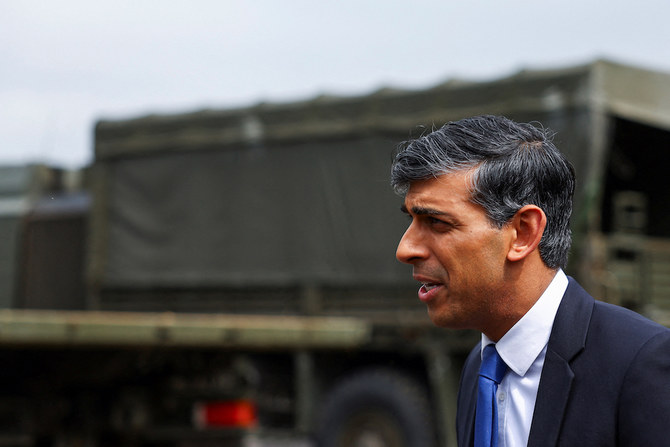
- Documents seen by Sky News reveal London has struck returns agreement with Baghdad
- They also suggest a desire to improve relations with Iran to return people to the country
LONDON: The UK considered sending asylum-seekers to Iraq for processing, new documents have shown.
Iraq is considered very dangerous, with the UK government advising against all travel to the country.
But a plan similar to the Rwanda scheme to process migrants in a third-party country was floated at one stage by Whitehall officials, with negotiations said to have achieved “good recent progress.”
The UK has struck a returns agreement with Baghdad for Iraqi citizens, which was achieved without a formal announcement or acknowledgement and a plea for “discretion,” the documents, seen by Sky News, suggest.
The cache of papers casts new light on the UK government’s approach to dealing with asylum-seekers and illegal migration, including a desire to improve relations with the Iranian Embassy in London in order to ease the repatriation of Iranian citizens, and moves to establish return agreements with Eritrea and Ethiopia.



